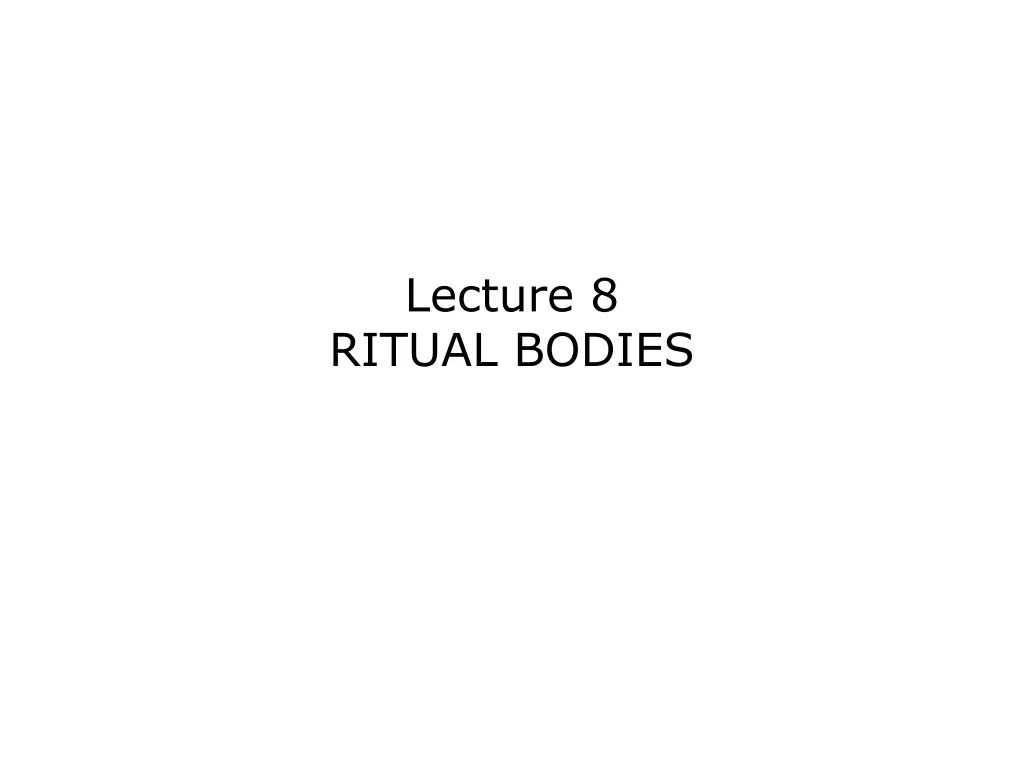
Exploring Ritual Bodies and Structuralist Assumptions
Dive into the fascinating world of ritual bodies and structuralist assumptions in this thought-provoking lecture. Learn about pollution, stable characteristics, gender restrictions, eligibility for worship, and more, all tied to the intricate classification systems that shape our understanding of the sacred and profane.
Download Presentation

Please find below an Image/Link to download the presentation.
The content on the website is provided AS IS for your information and personal use only. It may not be sold, licensed, or shared on other websites without obtaining consent from the author. If you encounter any issues during the download, it is possible that the publisher has removed the file from their server.
You are allowed to download the files provided on this website for personal or commercial use, subject to the condition that they are used lawfully. All files are the property of their respective owners.
The content on the website is provided AS IS for your information and personal use only. It may not be sold, licensed, or shared on other websites without obtaining consent from the author.
E N D
Presentation Transcript
Lecture 8 RITUAL BODIES
Pollution miaros (adj.) miasma (noun) miainein (vb.) miasma : stain, (physical/moral) pollution
Structuralist Assumptions 1. There is a human need to classify in order to understand. 2. Classification tends to be binary. 3. Whatever resists classification causes category anxiety. 4. Classifications are not always static, but can represent transitions. 5. Transition between categories is potentially dangerous. 6. Whatever resists classification, fails to transition successfully from one category to another, or is out of place is dirt. 7. Dirt is taboo; dirt is powerful; dirt is simultaneously attractive and repellant.
Structuralist Assumptions 3. Whatever resists classification causes category anxiety. GARDEN soil HOUSE dirt PLATE filth
Structuralist Assumptions 4. Classifications are not always static, but can represent transitional categories. INFANT CHILD ADOLESCENT ADULT CORPSE 5. Transition between categories is potentially dangerous. LIVING (above ground) GHOST (below ground) DEAD
Restrictions on Entrance into Sacred Space ELIGIBILITY STABLE CHARACTERISTICS PURITY FROM TEMPORARY CONDITIONS
Stable Characteristics age ethnicity kinship residence citizenship language gender various rites of passage Greek vs. non-Greek family/tribal affiliation township or deme Athenian vs. Spartan e.g. Eleusinian Mysteries male vs. female
Gender Restrictions sex life-cycle rituals segregated by sex war, athletics, political life MALE reproduction, fertility, domesticity FEMALE worship of some deities/aspects of deities segregated by
Eligibility for Artemis Worship FEMALE female prepubescent child MALE hunter (ritual abstention from sex) nubile female woman in childbirth
CHILDBIRTH TEMPORARY CONDITIONS PHYSICAL STATES BLOOD DEATH SEX ATTRIBUTES CLOTHING FOODS IRON
Female Body menstruation blood low surface integrity lactation milk childbirth fluids; child afterbirth placenta; fluids
Menstruation cold uterus female low internal heat flesh soft, spongy flesh absorbs fluids poor cooking of nutriment excess blood in tissues menstruation
A boy actually resembles a woman in physique, and a woman is as it were an infertile male. The female, in fact, is female on account of a sort of inability: namely, it lacks the power to cook [peptein] semen out of [blood] because of the coldness of its nature. Thus, just as lack of cooking [pepsis] causes diarrhea in the bowels, so in the vessels it produces various discharges of blood, and especially menstrual discharge The female is as it were a deformed male; and the menstrual discharge is semen, though in an impure condition namely, it lacks one constituent, and one only: the principle of soul. Aristotle, Generation of Animals 728a17, 737a
SACRED hieros MALE MALE/FEMALE FEMALE SECULAR d mosios POLLUTED miaros
PHYSICAL STATES DEATH SEX CHILDBIRTH within temenos outside temenos If anyone fornicates in the sacred precinct [temenos], the authorities shall make him expiate it by the sacrifice of an ox and by complete purification. Archaic inscription from Olympia
